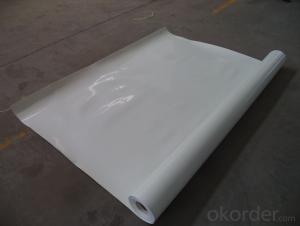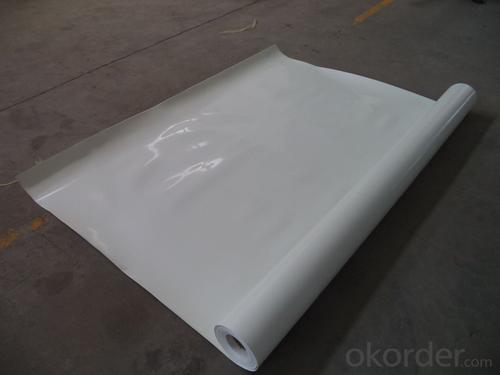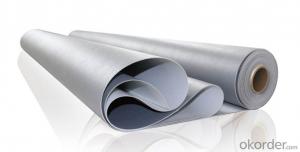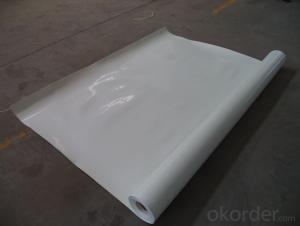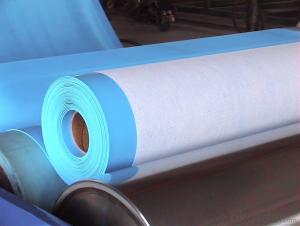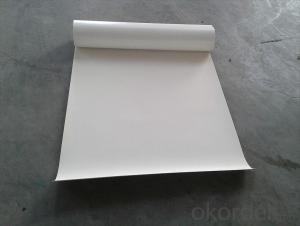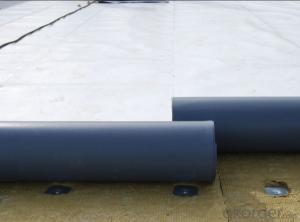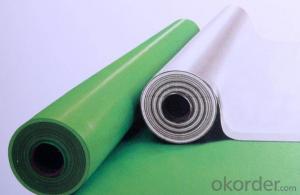TPO roof waterproof membrane good supplier
- Loading Port:
- Qingdao
- Payment Terms:
- TT OR LC
- Min Order Qty:
- 1000 m²
- Supply Capability:
- 1000000 m²/month
OKorder Service Pledge
OKorder Financial Service
You Might Also Like
1. Introduction
TPO (Thermoplastic Polyolefin) waterproof membrane is typically based on polypropylene and EP
(ethylene-propylene) rubber. TPO mainly contains carbon atoms and hydrogen atoms and doesn’t
contain any plasticizers and chlorine elements. It is a beautiful, long-lived eco-friendly product.
TPO membranes are installed mechanically-attached, fully-adhered or ballasted.
2. Specification
1) Size: 2.05m (width)*20m (length) or customized
2) Thickness: 1.2mm, 1.5mm, 2.0mm
3) Type: Homogeneous; Reinforced with Polyester felt; Fabric backing
4) Color: white/grey or customized
5) Note: exposed type
6) Certificate: ISO9001/14001
3. Applications
l Roof construction & steel structure of both industrial and civil engineering
l Underground engineering, such as subways, tunnels, air Raid shelter, etc.
l Sewage treatment, dam, reservoir and basement, grain storehouse, etc.
4. Features
l It’s easy to install with good system integrity, few accessories.
l Excellent tensile strength, tearing resistance and penetration resistance performance.
l No plasticizer. They have been tested as having excellent resistance to thermal aging and
ultraviolet, durable and exposed.
l Hot-air welding. The peel strength of joint is high.
l Fast welding speed.
l Environment friendly, 100% recycled, without chlorine.
l Durable hot welding performance and easy to repair.
l Smooth surface, no fading and pollution.
- Q: What are the benefits of using a waterproofing membrane?
- Using a waterproofing membrane has numerous advantages, particularly in construction projects or areas exposed to moisture or water. To begin with, the structural integrity of a building or infrastructure is safeguarded by preventing water penetration. Water can seep through cracks or joints, resulting in damage to the foundation, walls, or floors. By applying a waterproofing membrane, a barrier is created that stops water infiltration and potential structural problems. Furthermore, the growth of mold and mildew can be prevented by waterproofing membranes. Moisture and excessive water create an ideal environment for mold, which not only ruins the appearance of a space but also poses health risks. A waterproofing membrane keeps moisture out, reducing the likelihood of mold growth and creating a healthier and safer environment. Moreover, the lifespan of a structure can be prolonged with the use of a waterproofing membrane. By preventing water intrusion, building materials are protected from deterioration caused by moisture. This results in long-term cost savings on repairs and maintenance, as the structure remains in good condition for a longer period. Additionally, waterproofing membranes contribute to energy efficiency. By sealing off gaps or cracks, they help retain heat or cool air inside a building, reducing energy consumption and improving insulation. This leads to significant energy savings and lower utility bills. Finally, using a waterproofing membrane provides peace of mind. Knowing that a building or structure is protected from water damage, mold growth, and potential structural issues brings a sense of security and confidence, especially in areas prone to heavy rainfall, flooding, or high moisture levels. In conclusion, the advantages of using a waterproofing membrane are numerous. It protects against water damage, prevents mold growth, extends the lifespan of a structure, improves energy efficiency, and provides peace of mind. Whether for residential, commercial, or industrial purposes, incorporating a waterproofing membrane is a wise investment that ensures the longevity and durability of a building or infrastructure.
- Q: Can a waterproofing membrane be used for a commercial building roof?
- Yes, a waterproofing membrane can be used for a commercial building roof. Waterproofing membranes are commonly used in commercial buildings to protect the roof from water damage and leaks. These membranes are typically made from synthetic materials such as PVC or EPDM, which are highly durable and resistant to water penetration. They are installed as a protective layer on the roof surface, effectively preventing water from seeping through and causing damage to the building. Additionally, waterproofing membranes are designed to withstand various weather conditions, including heavy rain, snow, and UV exposure, making them suitable for commercial buildings that are exposed to harsh environmental elements. The use of a waterproofing membrane is an effective and long-lasting solution for ensuring the integrity and longevity of a commercial building roof.
- Q: Can a waterproofing membrane be used on below-grade structures, such as basements?
- Basements can benefit greatly from the use of a waterproofing membrane. Installing this membrane is highly recommended to avoid water infiltration and moisture problems. Acting as a barrier, the waterproofing membrane prevents water from seeping into the basement walls and floors. It is typically made of materials like bitumen, rubberized asphalt, or polyethylene, which are designed to be impermeable to water. The membrane can be applied either on the outside or inside of the basement walls and floors, creating a tight seal that prevents water damage, mold growth, and structural issues caused by water penetration. Therefore, it is essential to use a waterproofing membrane on basements and other below-grade structures to ensure a dry and safe living or storage area.
- Q: Can waterproofing membranes be used on underground structures?
- Yes, waterproofing membranes can be used on underground structures.
- Q: Can a waterproofing membrane be applied to tiled surfaces?
- Yes, a waterproofing membrane can be applied to tiled surfaces. In fact, it is common practice to use a waterproofing membrane underneath tiled surfaces, especially in areas prone to moisture such as bathrooms, showers, and kitchen backsplashes. The waterproofing membrane acts as a barrier to prevent water penetration into the substrate, protecting the tiles and the underlying structure from water damage. It is important to ensure that the tiled surface is properly prepared and free from any cracks or damage before applying the waterproofing membrane to achieve optimal results.
- Q: Can waterproofing membranes be used in wet areas like bathrooms?
- Yes, waterproofing membranes can be used in wet areas like bathrooms. These membranes are specifically designed to create a barrier against moisture and prevent water from seeping into the underlying surfaces. Applying waterproofing membranes in bathrooms is a common practice to protect the structural integrity of the space and prevent any water damage.
- Q: Can a waterproofing membrane be used in conjunction with roofing materials?
- Yes, a waterproofing membrane can be used in conjunction with roofing materials. In fact, it is quite common to use a waterproofing membrane as an added layer of protection for roofs. The membrane is typically applied directly on top of the roofing material, creating an additional barrier against water penetration. This is especially beneficial in areas prone to heavy rainfall or where the roof is exposed to high levels of moisture. The waterproofing membrane helps to prevent leaks, extend the lifespan of the roof, and protect the structure from potential water damage. Additionally, the membrane can also provide added insulation and energy efficiency benefits. Overall, using a waterproofing membrane in conjunction with roofing materials is a wise choice to enhance the waterproofing capabilities and durability of the roof.
- Q: Can a waterproofing membrane be used in saunas?
- Yes, a waterproofing membrane can be used in saunas. Saunas are high-moisture environments, and the use of a waterproofing membrane can help prevent water damage and protect the underlying structure from moisture penetration. The membrane acts as a barrier, preventing water from seeping through and causing potential issues such as mold, mildew, and rot. It is important to choose a waterproofing membrane that is specifically designed for high-moisture areas and can withstand the extreme heat and humidity of a sauna. Proper installation and adherence to manufacturer guidelines are also crucial to ensure the effectiveness and longevity of the waterproofing membrane in a sauna setting.
- Q: Does a waterproofing membrane require a topcoat or sealer?
- Yes, a waterproofing membrane typically requires a topcoat or sealer to enhance its durability and provide additional protection against external elements such as UV radiation, abrasion, and chemical exposure. The topcoat or sealer helps to further seal the membrane and extend its lifespan, ensuring long-term waterproofing effectiveness.
- Q: Can a waterproofing membrane be used in conjunction with green building practices?
- Certainly, a waterproofing membrane can be utilized alongside green building practices. In actuality, integrating a waterproofing membrane into the construction of a green building can greatly enhance its overall sustainability and efficiency. One of the fundamental principles of green building practices is to maximize energy efficiency and decrease the environmental impact of a structure. By installing a waterproofing membrane, the building's outer covering can be shielded from moisture intrusion, thereby preventing water damage and potential mold growth. This, in turn, aids in preserving the structural integrity of the building, reducing the necessity for costly repairs and replacements, which can consume resources and generate waste. Moreover, a waterproofing membrane can contribute to improved indoor air quality. By preventing water infiltration, it assists in creating a dry and healthy living or working environment, minimizing the risk of respiratory problems and other health issues associated with dampness. Furthermore, a waterproofing membrane can enhance the energy efficiency of a building. By preventing water from seeping into the walls or foundation, it lessens the potential for heat loss through moisture evaporation, thus reducing the energy required for heating and cooling. This can lead to decreased energy consumption and lower carbon emissions, aligning with the objectives of green building practices. However, it is crucial to select a waterproofing membrane that is environmentally friendly and compliant with green building standards. Seek out membranes that are crafted from recycled or sustainable materials and possess low VOC (volatile organic compound) content. Additionally, consider opting for a membrane that is designed for longevity and durability, as this can further minimize the environmental impact by reducing the need for replacement over time. In conclusion, a waterproofing membrane can be an invaluable addition to any green building endeavor. It serves to safeguard the building envelope, enhance indoor air quality, and improve energy efficiency. By choosing an environmentally friendly membrane, the overall sustainability of the building can be further enhanced.
Send your message to us
TPO roof waterproof membrane good supplier
- Loading Port:
- Qingdao
- Payment Terms:
- TT OR LC
- Min Order Qty:
- 1000 m²
- Supply Capability:
- 1000000 m²/month
OKorder Service Pledge
OKorder Financial Service
Similar products
Hot products
Hot Searches
Related keywords
